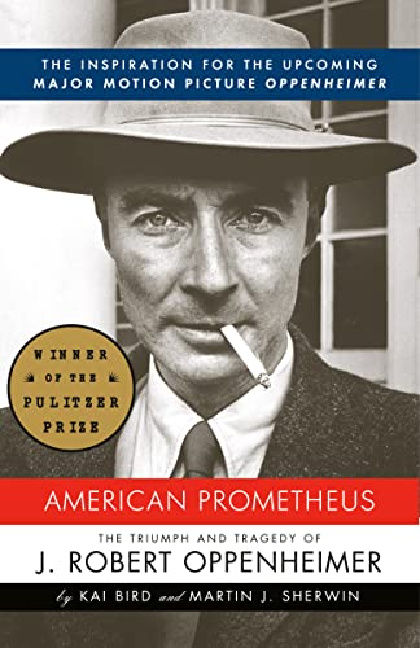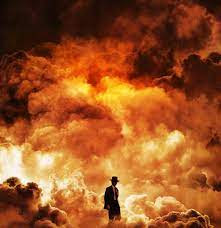The Nine Days: We, the Jewish People, have now entered the month of Av. This coming Sabbath is called the Sabbath of Vision (שׁבּת חזון) because of its Haftorah, the third in the series of three Haftorot of Affliction leading us to Tisha b"Av, the Black Fast on the ninth day of the month.
It is the custom in most synagogues to announce the month of Av as "Menachem Av" - literally, "Consoling The Father." The Talmud says, "When the month of Av begins, we reduce our joy." During the Nine Days we observe a greater level of mourning than during the Three Weeks.
Dr. Jack Shlachter, former head of the Theoretical Division of Los Alamos National Scientific Laboratory, talks about the outsized representation of Jewish physicists in leadership positions in the Manhattan Project during World War II.
He discusses many of them with personal stories about who they were. Fascinating inside descriptions Jews in scientific research during WWII.
In January 2021, The Jewish Week announced its acquisition by 70 Faces Media, the publisher of the Jewish Telegraphic Agency and other Jewish brands, under whose umbrella it continues as an all-digital brand.
I spoke to a rabbi/physicist (slogan: “Judaism for Your Nuclear Family”) about the Jewish backstory to “Oppenheimer” —
As Abq Jew expected, Andrew was referring to New Mexico's own "Physics Rabbi" Dr Jack Shlachter. And his FB post pointed to the just-published JTA article, At the heart of the film ‘Oppenheimer’ is a clash between real-life Jews. Which begins:
In 1945 physicist J. Robert Oppenheimer was a national hero, hailed as the “father of the atomic bomb” and the man who ended World War II.
Less than a decade later, he was a pariah, after the United States Atomic Energy Commission revoked his security clearance following allegations about his left-leaning politics at the height of the anti-communist McCarthy era.
Christopher Nolan’s biopic, “Oppenheimer,” which opens in theaters on July 21, will star Irish actor Cillian Murphy as the famous scientist.
But it will also feature Robert Downey Jr. as a lesser known real-life character, Lewis Strauss (pronounced “Straws”), the chairman of the AEC and one of Oppenheimer’s chief inquisitors.
The clash between the scientist and the bureaucrat was a matter of personalities, politics and the hydrogen bomb (Strauss supported it, Oppenheimer was opposed).
But according to amateur historian Jack Shlachter, the two represented opposites in another important way: as Jews.
Shlachter has researched how Oppenheimer’s assimilated Jewish background and Strauss’ strong attachment to Jewish affairs set them up for conflict as men who represented two very different reactions to the pressures of acculturation and prejudice in the mid-20th century.
Ya gotta read the article [Click here].
Andrew points out (as we New MexiJews already knew) that
Shlachter is in a unique position to explore the Jewish backstory of Oppenheimer: A physicist, he worked for more than 30 years at Los Alamos National Laboratory, the New Mexico complex where Oppenheimer led the Manhattan Project that developed the bomb.
Shlachter is also a rabbi, ordained in 1995, who leads HaMakom, a congregation in Santa Fe, New Mexico, as well as the Los Alamos Jewish Center.
Abq Jew had always thought that the Big Clash of the Manhattan Project was between Oppenheimer and Edward Teller, with whom Mr & Mrs Abq Jew once - in California, of course, where dreams used to come true - had occasion to meet and converse. But that's a story for another time.
In any event, Rabbi Jack offers a fresh perspective - on the post-Manhattan Project, post-WWII clash between Oppenheimer and Lewis Strauss, who was one of the five members of the original Atomic Energy Commission.
Rabbi Jack offered that perspective in Fifty (Well Maybe Two) Shades of Grey: Nuance in the Relationship Between Lewis Strauss and J Robert Oppenheimer, a talk that he recently presented to the J Robert Oppenheimer Memorial Committee, a Los Alamos-based nonprofit.
But back to the JTA article [Click here].
At one point in their discussion, Andrew says to Rabbi Jack:
I’ve read that Oppenheimer did not feel guilt over his contribution to developing nuclear weapons or the bombings of Hiroshima and Nagasaki but he did feel a sense of responsibility for what had been unleashed.
And Rabbi Jack responds:
Oppenheimer realized that a lot of people lost their lives as a result of this.
But I will tell you, my father was a GI during World War II, he enlisted in 1943 and fought until ’45. He was in Europe when V.E. Day came, and then came back to the United States for leave before he was going to be shipped out to the Pacific.
And my father was convinced to his dying day that the bomb saved his life [by ending the war with Japan]. And, you know, that was a widespread sentiment.
May we be comforted among the
mourners of Zion and Jerusalem -
and among the mourners of
Hiroshima and Nagasaki.








No comments:
Post a Comment